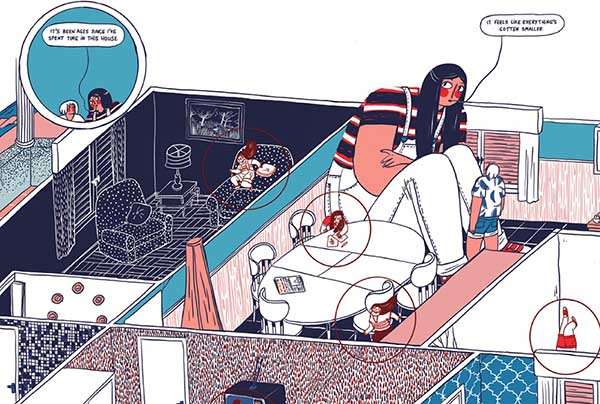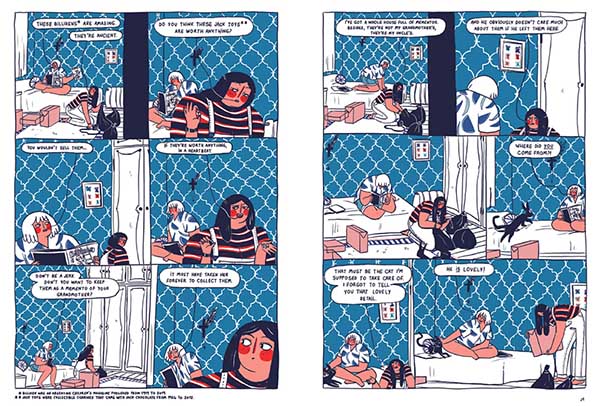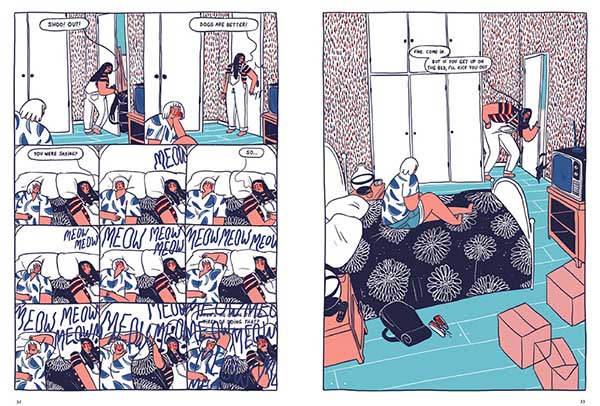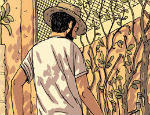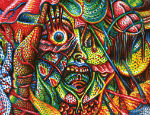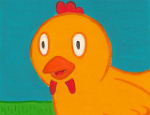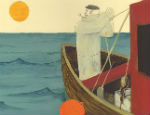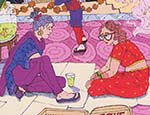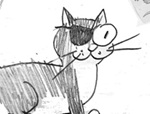Translated by the fantastic Andrea Rosenberg (of Ocultos and Totem acclaim), Mothballs from Sole Otero and Fantagraphics is set in Buenos Aires in the year 2001. The gorgeous Argentinian landscape of green flowering trees, pink pavements and yellow sunsets contrasts with the sombre mood; our protagonist, Rocío, is attending the funeral of her estranged grandma, Vilma, and it’s not a great turnout. The absence of friends and family is conspicuous. Wondering why her grandmother lived such an isolated existence, Rocío decides to dig into her family’s dark history. Choosing to stay in her grandmother’s old house she grapples with her mixed emotions towards the matriarch.
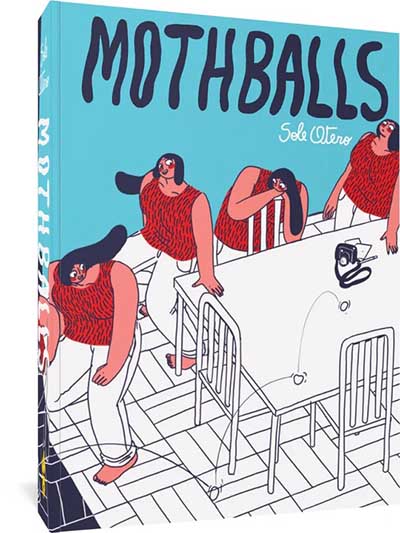
Rocío’s relationship with her grandmother was fractured, to say the least. Vilma almost always appeared disparaging and disinterested. And yet, it is after her passing, whilst sorting through her mothball-clouded home, that Rocío begins to feel some kinship with her. Dancing between the present and Italy at the beginning of the 20th century, the reader learns more about Vilma’s difficult upbringing; from a months-long tumultuous voyage from Italy to Argentina, her brother’s hidden homosexuality, feeling responsible for her mother’s unhappiness, and a loveless marriage, Vilma’s life was filled with unkindness and tragedy.
In an intimate chapter set in the past, we get a glimpse of Vilma’s first romantic experience as a young woman, which goes a long way to explaining her inherent sense of distrust throughout the rest of her life. Though initially thoughtful and kind, the scene in which the man (only ever referred to as ‘he’) coerces Vilma into having sex with him is heartbreaking. Whilst on the surface, he appears to be a suave, handsome, successful businessman, when straddling and pinning down Vilma, he becomes reptilian, his forked tongue hissing out lies: “don’t pretend you don’t like it”. Using dark blues and blacks in the background to contrast with the stark white Vilma, her distress is paramount; the darkness encompasses her, she stops struggling, and dissociates, as lizard-like creatures’ swarm around her, leering. Her life after this experience is moulded and shaped to fit the ideals of others; being a mother, housewife, and docile. As Ro reflects on how this encounter would have affected her grandmother, she begins to understand why their relationship was so fractured.
Ro’s present-day narrative and Vilma’s in the past are differentiated by two major aspects. The first is a door that hedges the gap between their chapters – in each of these full-page spreads, someone exits Vilma’s life, usually because she has pushed them away, departing through the door, whilst Vilma remains on the other side. This mirrors Ro’s actions of distancing herself from her family and friends in the present, and how the cycle of generational trauma continues.
The other difference is the use of colour in their separate narratives; whilst Ro’s story uses a plain, non-distinct white background, with brightly illustrated characters and blue accents, Vilma’s narrative always uses a pale pink backdrop, primarily using a darker pink to accentuate character traits. The artistic style remains a staple throughout, maintaining continuity between the two stories, but the different colour palettes allow for them to be nonetheless, distinct. The occasional flashbacks in which Ro is speaking with her grandmother do a great job of combining the personalities of the two women through the colour choices; the modern, stark-white background is still present, the colours are muted, but both women stand out with their identical blazing red cheeks, an artistic choice that is present throughout the whole of Mothballs.
The panels in which both the style and palette are transformed are a real treat. These are during Ro’s dream sequences, in which she feels her grandmother’s presence, and their two worlds blend into one. Here, the characters are merely drawn as a white outline, giving an illusion of transparency. Contrasting against the deep blues of the background, Ro and Vilma’s adventures in the dreamscape are reminiscent of swimming in the ocean, and are often accompanied by a stunning cacophony of colours; the swirling rainbow waves, shells and bubbles. Here, they are able to meet each other on equal terms, and with mutual understanding of each other’s hardships.
Tender, humorous and heart-wrenching, Mothballs’ family saga highlights the impact of generational trauma, the importance of healing as a family, and of breaking the chain of violence, secrets and sadness. A wonderfully thoughtful debut from Sole Otero.
Sole Otero (W/A), Andrea Rosenberg (T) • Fantagraphics Books, $29.99.
Review by Lydia Turner





